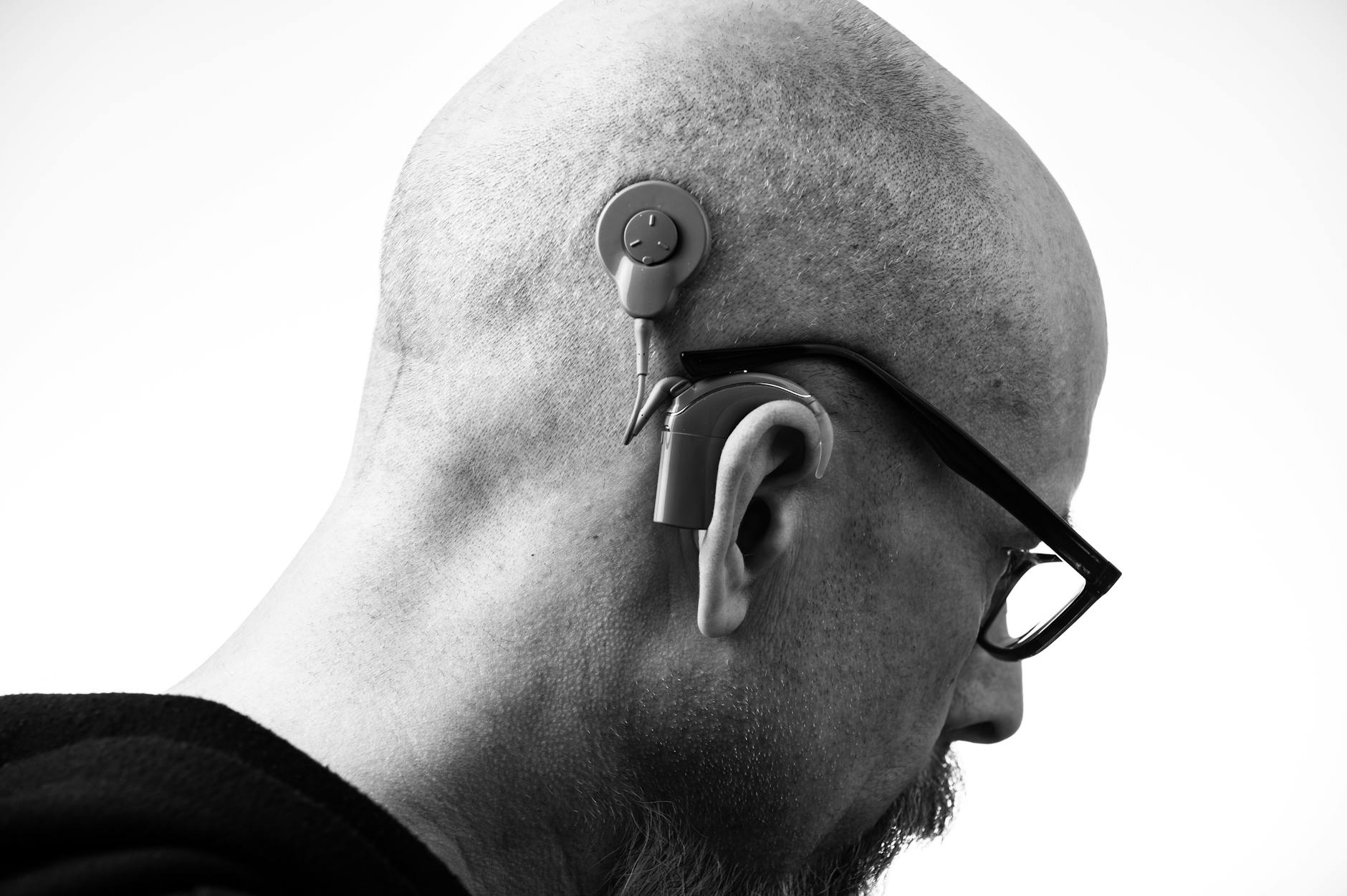Your ears aren’t just passive microphones. They’re living tissue, richly supplied with blood, immune cells, and even receptors that respond to hormones. That’s why life chapters like perimenopause, pregnancy, and thyroid shifts can bring ear surprises—tinnitus that shows up at 3 a.m., new difficulty following conversations in noise, or a stubborn feeling of fullness.
The good news: understanding what’s normal (and what’s not) can make these phases far less stressful. Here’s a clear, practical guide to the hormone–hearing connection—and what you can do about it today.
How Hormones Touch Your Hearing
Inside the cochlea (your inner-ear "microphone"), sound is translated into neural signals with exquisite precision. Hormones influence that process in a few key ways:
- Blood flow and fluid balance: Estrogen and progesterone can influence microcirculation and inner-ear fluid dynamics. Swings may briefly alter sound sensitivity or pressure sensations.
- Neural signaling: Research suggests estrogen receptors exist in parts of the inner ear and auditory pathway. Changes can affect how well you pick out speech in noise.
- Immune modulation: Hormones talk to the immune system. Fluctuations can nudge inflammatory pathways that sometimes influence tinnitus or ear fullness.
- Bone turnover: The tiny middle-ear bones and the bony capsule around the cochlea can be affected by systemic bone metabolism over time.
None of this means you’re destined for hearing trouble. It simply explains why the ear can feel different during big hormonal transitions—and why targeted habits and timely check-ins with an audiologist are so helpful.
Perimenopause and Menopause: What to Expect
Common ear changes
- Tinnitus (ringing, hissing, or buzzing) that fluctuates with sleep, stress, or hot flashes
- Harder time in noisy places even if a quiet room feels fine
- Ear dryness or itch (skin changes affect the ear canal, too)
- Sound sensitivity feels up-and-down, especially when fatigued
What the evidence says
Large population studies suggest that after menopause, the risk of measurable hearing loss is higher compared with premenopause. Notably, one cohort found that hormone therapy use was not protective—and certain formulations were associated with a slightly higher risk of hearing loss over time. That doesn’t mean hormone therapy causes hearing loss; it means we shouldn’t rely on it to protect hearing. Age, noise exposure, cardiovascular health, and metabolic factors still do much of the heavy lifting in determining long-term ear outcomes.
Bottom line: if hearing feels different around midlife, you’re not imagining it. But there’s a lot you can do.
Practical steps during perimenopause/menopause
- Book a baseline hearing test around your mid-40s to early 50s, sooner if you notice changes. Annual or biennial checks help you track trends and act early.
- Turn down your daily noise dose: Home blenders, hair dryers, fitness classes, and yard tools add up. Use hearing protection for loud tasks and aim for quiet breaks during the day.
- Support circulation: Move your body most days, prioritize sleep, and keep blood pressure, blood sugar, and lipids in a healthy range. The same habits that protect your heart help the inner ear.
- Stress and sound level journaling: If tinnitus spikes, note sleep quality, caffeine/alcohol, and noise exposure. Patterns guide simple tweaks.
- Leverage technology: Directional microphones in modern hearing aids, remote mics for restaurants, and live-transcription apps can dramatically improve conversations in noise—even before you need full-time amplification.
Considering hormone therapy for other symptoms? That’s a thoughtful discussion with your clinician. For hearing specifically, it’s better to focus on noise control, cardiovascular health, and early hearing support.
Pregnancy and the Postpartum Window
Pregnancy is a fluid-shift masterclass. Estrogen and progesterone rise, blood volume expands, and mucous membranes swell. Your ears notice.
Common, often temporary changes
- Fullness or pressure from Eustachian tube congestion (especially with nasal stuffiness)
- Occasional tinnitus, often tied to fatigue, anemia, or stress
- Sound sensitivity (the world can feel louder when you’re sleep-deprived)
When to call a professional
- Sudden hearing loss in one ear or both (urgent—same-day medical evaluation is recommended)
- Persistent one-sided fullness or hearing drop
- Severe spinning vertigo, especially with headache or neurological symptoms
- Painful ear pressure that doesn’t ease with gentle measures
Otosclerosis—a condition where bone grows abnormally around the stapes bone in the middle ear—can coincide with pregnancy for some people and may worsen conductive hearing loss. If you have a history of otosclerosis, keep an audiology/ENT on your pregnancy team.
Comfort strategies that are generally pregnancy-friendly
- Manage congestion gently: humidifier, nasal saline rinses, and steam can help. Check any medications with your obstetric provider.
- Equalize pressure without force: swallowing, sipping water, yawning, and chewing sugar-free gum are safer than forceful pressure maneuvers.
- Protect your hearing: yes, it’s safe to use earplugs around loud events, home tools, or concerts during pregnancy.
- Sleep, hydration, iron status: all can influence tinnitus and sound sensitivity. Bring concerns to your prenatal visits.
New baby on board? Newborn cries can hit 100 dB at close range. Keep some comfortable, high-fidelity earplugs handy for soothing sessions—they’ll protect your ears without disconnecting you from your baby’s needs.
Thyroid Health and Hearing
Thyroid disorders—especially hypothyroidism—have been linked with a higher likelihood of sensorineural hearing changes and tinnitus in studies. Mechanisms may include altered metabolism in the inner ear, fluid shifts, and immune effects (as in autoimmune thyroiditis).
What this means for you:
- If you’ve been diagnosed with thyroid disease and notice new hearing changes, tinnitus, or balance symptoms, schedule an audiologic evaluation. It’s a helpful baseline even if you expect improvement as your thyroid normalizes.
- Treat the thyroid first, then reassess hearing. Hearing may improve when hypothyroidism is corrected, though not always fully—especially if other factors (noise, age) are present.
- Autoimmune red flags (fluctuating hearing, aural fullness, ear pressure with immune conditions) deserve an ENT/audiology workup.
What About Birth Control and Other Hormones?
Data on oral contraceptives and hearing are mixed and limited. Some people report tinnitus changes on certain pills or during hormone-free intervals; others notice no difference. If a clear pattern emerges for you, discuss options with your prescriber—sometimes small formulation changes help.
For menopause hormone therapy, current evidence doesn’t show reliable protection for hearing. Choose hormone therapy based on overall symptom goals and medical guidance, and protect hearing with the proven pillars: sensible noise habits, cardiovascular health, and early support for listening in noise.
Your 10-Minute Weekly Ear-Health Routine
Small, consistent actions beat grand overhauls. Try this quick routine once a week:
- Noise audit (2 minutes): Where did things get loud? Plan ear protection for repeats: spin class, blender, leaf blower, stadiums.
- Sleep check (1 minute): If you’re short on sleep, expect more tinnitus. Prioritize a quiet wind-down and consistent schedule.
- Move and breathe (3 minutes): A brisk walk or simple mobility routine boosts circulation to head and neck.
- Hydration + nutrition (2 minutes): Keep fluids up. If salt, alcohol, or caffeine clearly spike your tinnitus, dial them back on high-stress days.
- Tech tidy (2 minutes): Turn on safe-listening limits on your phone. Save a favorite speech-to-text app and a white-noise track for rough tinnitus days.
Tools That Make Life Easier Right Now
- Smartphone decibel meters help you spot sneaky loud environments and act before your ears fatigue.
- At-home hearing screens (calibrated apps or online digits-in-noise tests) can flag changes between clinic visits. Follow up with a professional test if anything seems off.
- Assistive mics clip onto a conversation partner and beam clean speech to hearing aids or earbuds with accessibility features.
- Tinnitus support via sound enrichment: soft nature sounds, fans, or purpose-built apps can take the edge off during flare-ups.
When to See an Audiologist or ENT
- New or worsening tinnitus that disrupts sleep or concentration
- Any sudden drop in hearing (especially one ear)—treat as an emergency
- Persistent ear fullness or pressure without a clear cause
- Difficulty following speech in noise that’s starting to affect work or relationships
- Known thyroid disease with new hearing changes
- History or suspicion of otosclerosis, especially during pregnancy
An audiologist can translate your listening struggles into clear, data-backed options—from targeted hearing strategies to assistive devices and, when needed, medical referrals. If you’re pregnant or managing hormonal therapy, loop in your OB-GYN or primary care clinician so everyone’s on the same page.
Further Reading
- Snore Now, Hear Less Later? How Sleep Apnea Can Sap Your Hearing (and What to Do About It) (Hearing Loss) - When Sound Vanishes Overnight: Treat Sudden Hearing Loss Like an Emergency (Hearing Loss) - Diabetes and Your Hearing: What High Blood Sugar Does to Your Ears (and How to Protect Them) (Hearing Loss) - Hormones Have Ears: How Menopause, Thyroid, and Stress Shape Hearing and Tinnitus (Research)Frequently Asked Questions
Does hormone therapy (HRT) improve hearing or tinnitus?
Current research doesn’t show reliable hearing protection from HRT, and some studies suggest certain formulations may be associated with a slightly higher risk of hearing loss over time. If you use HRT, choose it for overall symptom control in consultation with your clinician, and protect your hearing with proven habits: control noise exposure, support cardiovascular health, and seek early audiology support when listening gets hard.
Is it safe to get a hearing test during pregnancy?
Yes. Hearing tests are noninvasive and safe in pregnancy. If you notice sudden hearing changes, one-sided fullness, or bothersome tinnitus, schedule an audiology appointment and let the clinic know you’re pregnant so they can tailor the visit (for example, avoiding certain pressure tests if there’s discomfort).
Can thyroid medication restore hearing?
Sometimes hearing improves when hypothyroidism is treated, but results vary. If hearing loss has multiple contributors (age, noise, genetics), thyroid correction may not fully reverse it. The best approach is to treat the thyroid condition and get a hearing evaluation to map where you are now and decide on additional support if needed.
Can birth control pills cause tinnitus?
Evidence is limited and mixed. Some people notice tinnitus changes with specific formulations or during hormone-free intervals, while many notice no change. If you see a clear pattern, talk with your prescriber about alternatives and consider an audiology check to rule out other contributors.


